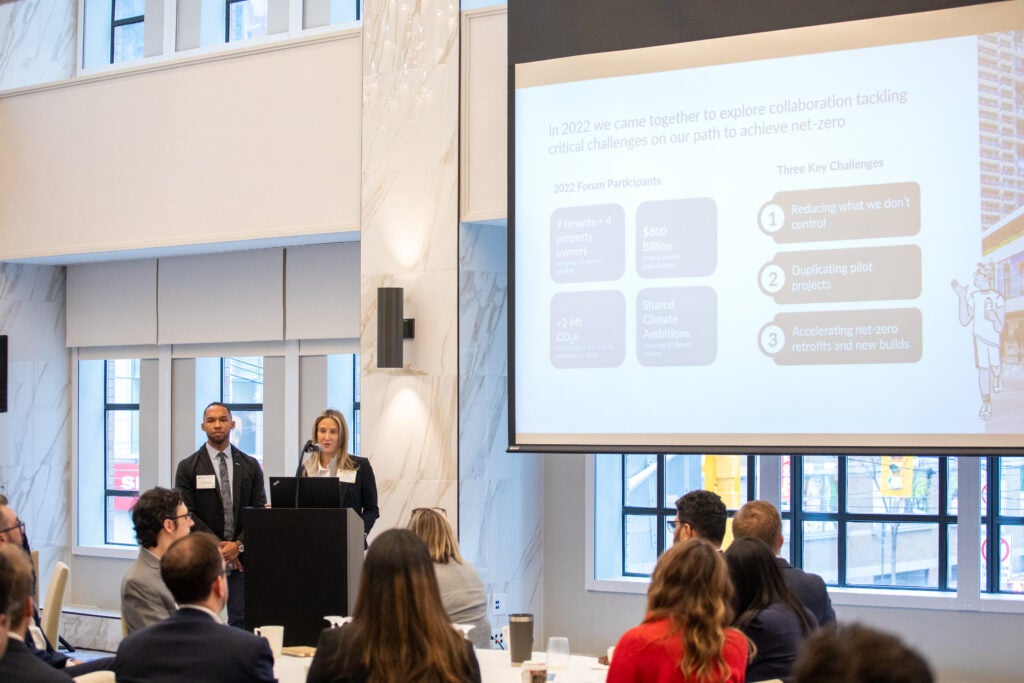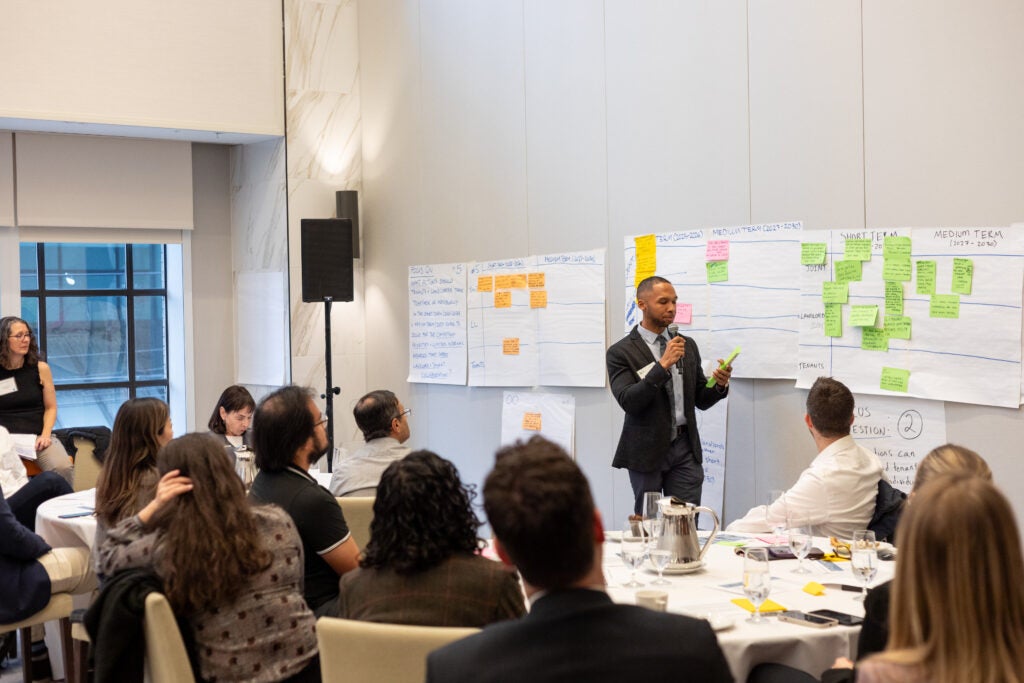
Uniting Canadian retail leaders to support their climate initiatives through collaboration and innovation.
Why We Need to Take Action?
Since 1950, atmospheric carbon dioxide levels have surged dramatically, leading to unprecedented global temperature increases and record levels of greenhouse gas emissions in 2023. Climate-related natural disasters are on the rise, posing severe risks to the livelihood of millions globally and causing significant economic losses.
Buildings are the third-largest source of emissions in Canada, following oil & gas, and transportation. The industry’s current trajectory is insufficient to achieve net-zero emissions in Canadian buildings by 2050. We must increase the pace of retrofits and rethink how we design and construct new buildings.
Retail buildings present specific challenges. Due to the interconnected operational model of retail tenants and landlords, it is essential to collaborate to progress our respective climate initiatives and emissions reduction goals.
What is the Collaboration for Climate Action Forum?
On November 28, 2024, we hosted our second Collaboration for Climate Action Forum in collaboration with Canadian Tire, RBC and Quinn & Partners. The Forum brought together leaders from retail tenant and landlord organizations for a day of insightful discussions and collaborative efforts aimed at achieving a reduction of emissions faster.
The Forum is a unique gathering that focuses on fostering collaboration between retail tenants and landlords to tackle common challenges in the journey towards decarbonization. The event provided a platform for stakeholders to share innovative solutions, learn from each other, and brainstorm the many ways that all parties can work together to achieve intersecting decarbonization and net-zero goals.
This one day event has doubled in numbers since it was first held in 2022 and has significantly expanded in terms of individual stakeholder domains. Participation from retail landlords included FCR, CT REIT, Crombie, Choice Properties, Brookfield Properties, RioCan, Smart Centres, and Morguard. Retail tenants in attendance included Canadian Tire, RBC, Loblaws, Longo’s, Sobeys Dollarama, Scotiabank, BMO, Metro, TD Canada Trust, TJX, Empire Companies Ltd, and CIBC, along with industry associations REALPAC, BOMA Canada and the Retail Council of Canada. The individuals representing these organizations had a wide range of expertise, working across many different areas within the retail industry including, construction, development, leasing, legal, finance, building operations and sustainability.
The collective market cap of the companies at the Forum was over $900 billion, a 55% increase since 2022. The total GHG footprint represented also rose from 2 million tonnes of greenhouse gas emissions in 2022 to over 3.6 million tonnes due to increased participation and more buildings being included in scope.
The significant interest from our retail peers and tenants in the Forum demonstrates a shared view that collaboration is a viable strategy to decarbonizing retail buildings and the industry is open to new ways of thinking.
Melissa Ferrato, Vice President, ESG, First Capital REIT
What was accomplished?
The day began with attendees networking to connect and prepare for the sessions ahead. Next, a keynote address provided a comprehensive overview of both the urgency and business case for decarbonization. The address also highlighted upcoming regulatory changes and trends in the market, technology, and real estate ecosystem.

A panel session followed, featuring representatives from FCR, RBC, Canadian Tire and CT REIT. This session provided valuable insights into real world solutions and strategies. The facilitated panel discussion and audience Q&A allowed for an engaging exchange of ideas and experiences.
Panelists shared their successes and lessons learned from pilot projects and initiatives, offering attendees a glimpse into the future of collaborative decarbonization efforts. One such initiative is a formal collaboration between FCR and RBC to decarbonize RBC branches located at FCR properties. As discussed during the panel, First Capital and RBC have agreed to prioritize the installation of lower emissions generating HVAC equipment across their leased spaces through the process of electrification. This collaboration supports both organizations in their goal to reduce greenhouse gas emissions.
Landlords are a significant stakeholder in our journey to reduce emissions and that’s why I’m excited to share that RBC will be collaborating with First Capital REIT with respect to the decarbonization of commercial retail properties.As a major landlord that operates several RBC branch locations, the collaboration with First Capital is important in addressing RBC’s operational emissions controlled by landlords, and a signal to the marketplace that this should be a priority. I anticipate engagement like this will help drive more climate action in the real estate sector.
Jon Douglas, Director, Global Climate & Sustainability Operations, RBC


In the afternoon, participants split into groups to brainstorm actions for significant carbon reductions by 2025-2030. They tackled five key challenges faced by landlords and tenants in reducing greenhouse gas emissions.




Summary of the five key challenges:
High Capital Requirements and Uncertain Financial Returns: Decarbonizing buildings often requires substantial upfront investment, particularly for large-scale retrofits and electrification. Many landlords and tenants struggle to justify these costs, as short-term financial returns may not meet hurdle rates or justify the long-term environmental benefits. This challenge is exacerbated if there is not a clear business case for decarbonization, limited incentives, higher interest rates, and insufficient tax or financing mechanisms to ease the financial burden.
Complexity of Data Collection and Data Management: Consistently tracking and reporting energy use and emissions data is challenging. Many times, landlords and tenants do not have access to whole building data. Data collection practices, cadence and systems often vary, making it difficult to accurately measure progress and set actionable goals. This lack of standardized, timely and high-quality data limits both landlords’ and tenants’ ability to make informed decisions about where and how to invest in emissions reduction.
Dependency on Tenant – Landlord Cooperation and Cost-Sharing Barriers: Decarbonization in tenant-controlled spaces requires close collaboration between landlords and tenants and the sharing of investment costs and operational savings, but long-term leases and existing cost structures make cooperation challenging. Many tenants may be reluctant to invest in an asset which they do not own, and landlords do not achieve financial payback on operational savings. Landlords may also lack leverage to mandate energy efficiency and decarbonization efforts in tenant spaces. This creates a gap in achieving whole-building emissions reduction.
Grid Decarbonization and Capacity Limitations: Building electrification depends on the availability of low-carbon electricity and grid capacity, which vary by region. Limited electric grid capacity in certain areas restricts the potential for large-scale electrification. In addition, many shopping centres are already experiencing capacity constraints due to installation of EV chargers. This uncertainty can deter investment in electric-based technologies, as landlords and tenants are unsure if the grid will support future low-carbon needs.
Competing Priorities and Limited Internal Resources Impede Landlord – Tenant Collaboration: Decarbonization planning is time-intensive and requires a coordinated effort across multiple departments as well as robust engagement between landlords and tenants. Internally, both landlords and tenants have competing priorities, limited staff dedicated to sustainability and external stakeholder engagement, as well as internal stakeholders who may lack buy-in or expertise in decarbonization. These factors create challenges for effective collaboration, slowing progress on decarbonization initiatives that demand both independent and joint action.
By day’s end, participants regrouped to discuss breakout session results, gaining a deeper understanding of the proposed solutions and their potential impact. The Forum concluded with a recap, as attendees continued to network and review results, fostering collaboration and relationship-building.
We are proud to convene such an influential group of retail leaders. We know that we cannot solve climate change by working in individual silos. Our hope is to build a collaboration model that can be adopted in other industries too.
Francisca Quinn, Founder and President, Quinn+Partners
Taking Action Through Collaboration
The 2024 Collaboration for Climate Action Forum focused on decarbonizing Canadian retail real estate, offering insights into pilot projects on data, technology, and regulatory cooperation. It served as a platform for shaping future industry standards through engagement with various stakeholders. Sessions aimed at generating collaborative solutions facilitated the development of strategies for achieving lower GHG emissions. As the industry works towards lower emissions, the insights and collaborations from this Forum are expected to influence its progress.
A report summarizing the breakout group solutions and next steps will be released to participants in early 2025.
